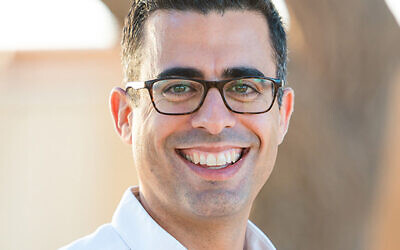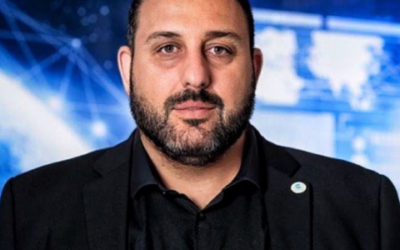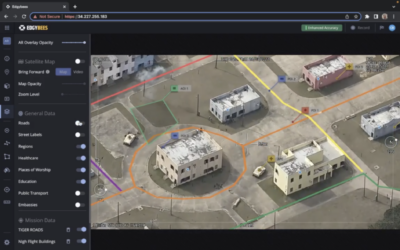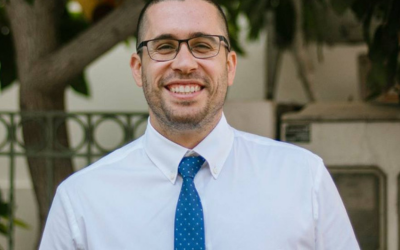Israel’s tech teams helping to battle Hamas
A company calling out fake news and one that is using AI to help find the hostages are among the Israeli startups using technology to support Israel’s war efforts
Israel’s technology startups are playing a key role in response to the 7 October Hamas attacks, joining the war effort on multiple fronts.
While a chunk of the industry’s workforce have been called up for reserve military service – over 50,000 high tech workers have reported for duty – the companies themselves are working harder than ever to harness their tech solutions to make a real difference.

Social threat intelligence company Cyabra has been on the frontlines of the online media war. The company, which is using its expertise for national security, has identified a bot network of over 40,000 fake profiles spreading pro-Hamas propaganda and fake news. Thousands of them were created more than a year before the 7 October terror attack. When 7 October came around, they were posting 100 times a day.

The Tel-Aviv based company uncovered one in four profiles engaging in conversations about the Hamas-Israel war in the first two days of the conflict that were fake.
“With ‘regular’ conversations taking place online, it’s usually about 3-5 per cent, so one in four is big,” said Rafi Mendelsohn, Cyabra’s VP of marketing.
He told the Jewish News: “When the war started, we immediately turned to using the Cyabra technology for the purpose of understanding disinformation and the influence operation campaigns being conducted on social media by Hamas.
“By knowing and understanding the situation and identifying the scale and sophistication of the accounts, you can gain a lot of knowledge, and we have provided all that info to the relevant organisations.”
Also making an impact are mPrest, which created the software behind Israel’s Iron Dome anti-missile defense system, Edgybees, which transforms satellite and motion imagery into actionable insight, and crisis management company, Code Blue Cyber.

The day after the Hamas terror attacks, Code Blue Cyber’s co-founder Refael Franco, former Deputy Head of the National Cyber Directorate, set up a platform to help locate the missing and kidnapped individuals.
A team of tech volunteers have been spending the past three weeks in the cyber ‘war room’ in Code Blue Cyber’s Tel Aviv hub, sifting through social media posts matching them with photos of those missing provided by their families. Technology including facial recognition, geo location and AI is then used to locate where they were last seen. This information is shared with the Israeli military’s unit overseeing the hostage crisis, with over 60 captives being successfully identified, including those that are still being held by Hamas. Google and Microsoft also provided their tech services to help Code Blue Cyber’s efforts.
Refael Franco told the Jewish News: “As soon as I understood what had happened on that Saturday, I wanted to do all I could to try and find the missing people.

“We have never seen anything like the October 7 attacks – they are some of the worst videos I have ever seen. Because this is such a traumatic crisis, the economy and high tech sectors have joined to help, everyone has tried to volunteer to do something, and a lot of people with tech backgrounds have been helping both our projects and other projects. The tech sector in Israel is strong, we can use our tech to help mitigate the crisis and the damage.”
Herzliya-based Edgybees can instantly make motion and satellite imagery of any source accurate and ready for machine-based analytics and human-assisted decision support.

Edgybees’ software aligns aerial video and satellite imagery with reference data in real-time, which can mean the difference between moving ahead or calling off a mission. The Herzliya-based startup, which has a subsidiary in the US, has active contracts with multiple Israeli defense groups. The company has been working closely with defense units to accelerate and expand parts of Edgybees’ solution in support of the current efforts.
Edgybees CEO Shay Har-Noy, said: “Gaza is a really densely populated area – a handful of metres make a big difference, so being able to know where exactly things are can saves lives on both sides.”
He said: “Every satellite photo that’s captured from above involves positional error, and in densely populated areas, if your footage is off by 10 meters, you could be looking at the wrong building. Our software dramatically increases the accuracy of gathered data. When collecting intelligence, you can use our software to cross-reference your data with maps, addresses and elements gathered from other sensors.”

Colorado-based Har-Noy added: “As soon as the war started, we saw a major increase in the impact of what we were able to do, prioritising certain projects. “It’s a really difficult time for the whole country and the whole company, and this also delays contracts and what we were doing as part of our normal business, but also makes our technology very relevant. Being able to lean in and support is something we are really proud to do.”
Ron Stern is General Partner and Head of Portfolio Management at Our Crowd, the global equity investment platform based in Jerusalem, which counts Cyabra, Edgybees and Mprest in its portfolio.
He said: “Hundreds of Israeli companies are prioritising IDF needs and providing their products and services at cost or sometimes for free, towards the war effort, empowering the IDF with the newest and best technologies.
“The one-degree separation between Israel’s tech sector and nearly all units of the IDF, has allowed many IDF units to reach out to tech companies directly, with specific needs, shortening the lengthy red-tape procurement process. We know of multiple examples of Israeli technologies which have already been tested in battle, solving problems which were not known (or at least not a priority) to the IDF only a few weeks ago. Think of this; identifying a problem, finding who can fix it, building a solution to solve the problem and testing the solution in real battle situation, all within a few weeks. This is the true power of the Israeli high-tech echo system, stemming from the fact that the DNA of the IDF and that of the Israeli high tech sector are one of the same. All military tech companies are doubling down on production, customer service, training and everything else related to getting products and services into the field and assuring everything is working 100 per cent.”
Dor Bershadsky, executive director of UK Israel Business, the bilateral chamber of commerce fostering trade and investment between the UK and Israel, said that in the face of unprecedented challenges, Israel’s tech sector is proving its capacity for innovation and adaptability.
“Yes, there is trauma and deep shared sadness. But Israel’s tech sector operates fundamentally on two main default states: ‘growth’ and ‘crisis.’

“Many Israeli start-ups, already accustomed to functioning in crisis scenarios, have ‘playbooks’ in place to maintain operations even during conflicts. Now, these firms are extending their expertise beyond business continuity, actively contributing to the war effort. Whether it’s using AI to assist in logistical planning and, offering cyber-security capabilities to safeguard critical infrastructure, or procuring vital equipment for soldiers, the tech community is showcasing its resilience and unity.”
“What unfolds before us is not merely a sector in survival mode; it’s a sector proactively addressing the nation’s immediate requirements. This underlines the enduring status of Israel as a premier global epicentre for technological innovation, even in the toughest of circumstances.”
More than 300,000 reservists have been called up to the IDF – around 15 per cent are working in local tech companies – resulting in operational issues for several startups. According to a survey by the Israel Innovation Authority and Start-Up Nation Policy Institute (SNPI), about 70 percent of Israeli tech firms and startups are facing disruptions as their employees have reported for reserve duty.
A quarter of Edgybees’ team of 25 have been called up. “Yes it has an impact on our company, but the expertise that they bring from the commercial sector to their jobs means they can have a big impact,” said Har-Noy.
Nadav Kidron is CEO of Oramed Pharmaceuticals, a Jerusalem-based biotech company. He said: “As is the case throughout Israel, we find ourselves profoundly affected, both at an individual and collective level.
“Within the technology sector, companies are committed to maintaining operational continuity and meeting the evolving demands of customers, despite the considerable challenges we face.
“In the long term, the resilience and strength of our technology sector stand as a testament to Israel’s enduring capacity to navigate crises. Israeli companies have consistently demonstrated agility and an exceptional ability to manage amidst unexpected and challenging circumstances. It is part of what contributes to our ‘startup nation’ mentality. I am certain that this sector will persist in its role as a leading catalyst for innovation and growth, both within Israel and on a global scale.”

Thank you for helping to make Jewish News the leading source of news and opinion for the UK Jewish community. Today we're asking for your invaluable help to continue putting our community first in everything we do.
For as little as £5 a month you can help sustain the vital work we do in celebrating and standing up for Jewish life in Britain.
Jewish News holds our community together and keeps us connected. Like a synagogue, it’s where people turn to feel part of something bigger. It also proudly shows the rest of Britain the vibrancy and rich culture of modern Jewish life.
You can make a quick and easy one-off or monthly contribution of £5, £10, £20 or any other sum you’re comfortable with.
100% of your donation will help us continue celebrating our community, in all its dynamic diversity...
Engaging
Being a community platform means so much more than producing a newspaper and website. One of our proudest roles is media partnering with our invaluable charities to amplify the outstanding work they do to help us all.
Celebrating
There’s no shortage of oys in the world but Jewish News takes every opportunity to celebrate the joys too, through projects like Night of Heroes, 40 Under 40 and other compelling countdowns that make the community kvell with pride.
Pioneering
In the first collaboration between media outlets from different faiths, Jewish News worked with British Muslim TV and Church Times to produce a list of young activists leading the way on interfaith understanding.
Campaigning
Royal Mail issued a stamp honouring Holocaust hero Sir Nicholas Winton after a Jewish News campaign attracted more than 100,000 backers. Jewish Newsalso produces special editions of the paper highlighting pressing issues including mental health and Holocaust remembrance.
Easy access
In an age when news is readily accessible, Jewish News provides high-quality content free online and offline, removing any financial barriers to connecting people.
Voice of our community to wider society
The Jewish News team regularly appears on TV, radio and on the pages of the national press to comment on stories about the Jewish community. Easy access to the paper on the streets of London also means Jewish News provides an invaluable window into the community for the country at large.
We hope you agree all this is worth preserving.






















